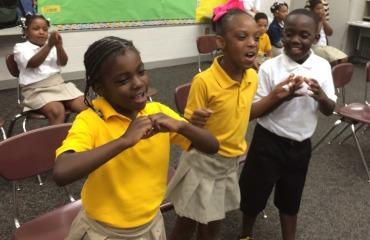
Section Branding
Header Content
Teaching Kids Music Through The Songs Around Them
Primary Content

The American South is rich with musical traditions. Now, a new program developed by Carnegie Hall in New York City is helping Savannah public school students learn the essentials of music through some of the sounds and styles around them.
One of those traditions is Ring Shout, developed by enslaved Africans and passed on to some of their descendants. Gullah-Geechee slave communities along the Georgia and South Carolina coast adapted musical styles with their roots in Africa to tell the stories of their lives on plantations.
The McIntosh County Shouters are preserving the traditional music, which combines singing, tapping a beat, and stomping in a circle.
Shouter Brenton Jordan says he’s especially excited to share this music, handed down in his family, with African American kids in the Savannah area.
"Their ancestors did this," he says. "A lot of the kids along the coast, their ancestors (shouted)."
Ring Shout – along with bluegrass, gospel, and other music with ties to the Low Country – is part of a music education curriculum called “Musical Explorers.” It was developed by the Weill Music Institute at Carnegie Hall. It began by introducing students in New York City to Haitian, Yiddish, and Argentinian artists living in the city’s five boroughs.
Shanna Lesniak is a teaching artist with Carnegie, which is partnering with the Savannah Musical Festival to bring the program here. Lesniak says the three-year program draws from more than a dozen artists and genres.
"And a lot of areas don’t have that in their community," she says. "So Savannah and the Low Country was perfect, because you guys are so rich in history and culture."
Lesniak visited Savannah earlier this semester to train music teachers, as well as regular classroom teachers, how to use the program to explain basic concepts like rhythm and pitch. They also receive a workbook, online support materials, and a CD.
At Savannah’s Spencer Elementary, music teacher Tony Jackson has been working with a group of active first-graders to help them learn the program's theme song.
"With Musical Explorers, we’re looking at diverse cultures, styles of music, right in their own back yard," Jackson says. "So they don’t have to travel across the world to see a Gullah-Geechee performance."
The Savannah Music Festival's Executive and Artistic Director, Rob Gibson, says he hopes the program will expose local students to rich musical traditions of the region.
“These styles of music are the ones that can be then taught to the kids who are growing up in the South, that they can feel proud being not just southern, but being American.”
Ring Shouter Brenton Jordan says he hopes that learning music from the region will prompt some students to ask questions about their own family histories.
"Connecting to who they were, connecting to themselves. Remembering the past," he says. "Even though the past has happened, it’s always good to acknowledge and remember so that we do not make the same mistakes."
In addition to Savannah, Carnegie Hall is also piloting a similar Musical Explorers program in Santa Monica, Ca., with the hope of expanding it further in the coming years.
The first “Musical Explorers” concert, featuring Low Country artists from the music program, takes place Dec. 8, at Savannah’s Lucas Theatre.
Tags: savannah music festival, Musical Explorers, education, Spencer Elementary, Shanna Lesniak, Sarah McCammon, GPB News, GPB Savannah, Tony Jackson, Rob Gibson
